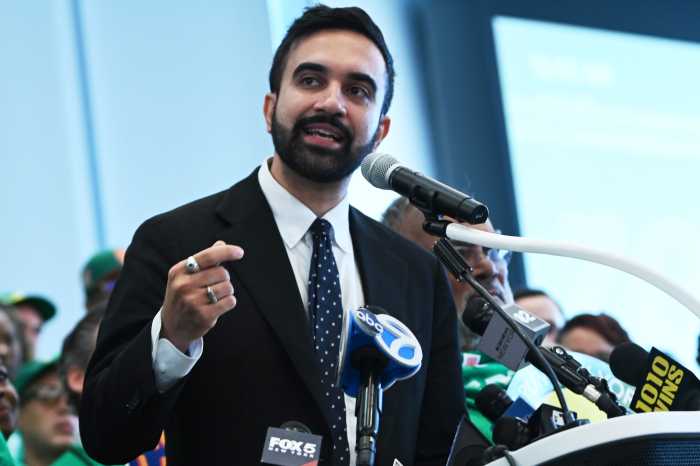In a press release hailing the ruling, the Lesbian and Gay Rights Project of the American Civil Liberties Union claimed this was the first decision by a state appellate court recognizing the validity of a federal equal protection claim by a lesbian or gay employee of a state institution.
Mary Jo Davis was hired by Pullman Memorial Hospital in 1993 and discharged the following year. Her boss was Dr. Charles Guess, a radiologist who had staff privileges at the hospital but was not a hospital employee.
From the beginning of her employment, Davis had trouble with Guess, who was very open about his opposition to hiring a lesbian to work in his department.
According to the opinion for the court by Judge Kurtz, Guess had, on a number of occasions, referred to Ms. Davis as “a fucking faggot,” “a fucking dyke,” and “a queer.” Guess was also heard to say, “I don’t think that fucking faggot should be doing vaginal exams and I’m not working with her.”
Dr. James Harrington, an emergency room physician, testified in an affidavit that he overheard Guess tell the hospital administrator, “I don’t think a queer should be doing vaginal exams,” and that the administrator replied, “I hear what you’re saying. We need to do something about it and we will.”
On one occasion when Davis was out from work, Guess treated the entire radiology department staff to an ice cream break. He told them that they were celebrating because Davis was absent, remarking that since it was gay pride week, she must be off marching somewhere. Although some staff members laughed, others said it was clear to them that Guess was not joking. Guess also frequently complained that Davis was inadequately trained and lacked the experience to do her job properly.
When Davis complained about her treatment, her immediate supervisor, Nan Miguel, joined in the complaints. Eventually, both Davis and Miguel were terminated. (In a separate lawsuit, Miguel is suing the hospital arguing she was a victim of retaliation.)
The ostensible reason for Davis’ termination was that she had photocopied material from two patient files in order to document her charges against Guess, and had given those materials to her lawyer. The hospital maintained that this was a breach of patient confidentiality in violation of work rules. The hospital also maintained that Davis had become a “disruptive employee” because she solicited various members of the staff to support her grievances against Guess and could not get along with him.
Davis filed suit against Guess and the hospital, as a public institution, claiming that her constitutional rights had been violated, as well as the public policy of Washington State. She got nowhere with either claim before the trial court, which found that there was no public policy against sexual orientation discrimination in Washington, which lacks a gay rights law, and that anti-gay discrimination is not forbidden by the federal Constitution’s Equal Protection Clause.
The court of appeals, while agreeing on the state law point, decisively rejected the federal law point.
In bringing her federal claim, Davis first had to overcome the hurdle that state institutions are not automatically liable for the unconstitutional actions of their employees. The matter was complicated further because Dr. Guess was an independent contractor of the hospital who was hired to run its radiology department but was not an employee. But Kurtz pointed out that courts have routinely treated independent physicians contracted to run part of a hospital’s operation as “employees” for purposes of determining whether the liability alleged involves a “state actor.”
Although the hospital had no formal policy of anti-gay discrimination, Kurtz found that Davis’ allegations implicated the hospital administrator in voicing agreement with Guess’ view that a lesbian should not be performing her job. Also, Guess apparently had authority when it came to getting the hospital to dismiss somebody. Given these circumstances, the appeals court found that the trial court was wrong to dismiss the case, since there was a disputed factual issue about the hospital’s potential responsibility.
Turning to the equal protection claim itself, Kurtz decisively rejected the trial judge’s observation that there was doubt whether there is a constitutional right to be free from harassment or discrimination on the basis of sexual orientation in a public facility. Citing Romer v. Evans, the 1996 U.S. Supreme Court decision in which an anti-gay Colorado constitutional amendment was declared unconstitutional, Kurtz wrote, “Romer holds state actions that treat homosexuals less favorably than other groups must advance some legitimate governmental interest,” or they will be found unconstitutional.
Kurtz also cited a federal appeals court ruling in Chicago that upheld an equal protection claim by Jamie Nabozny, a public high school student subjected to anti-gay harassment by students and teachers, and a recent federal trial ruling from Long Island in favor of a gay county police officer.
Based on these decisions, wrote Kurtz, “we hold that a state actor violates a homosexual employee’s right of equal protection when it treats that person differently than it treats heterosexual employees, based solely upon the employee’s sexual orientation.” The hospital offered no “legitimate purpose” that would justify firing Davis because she was a lesbian; instead it took the position that she was fired for violating confidentiality rules and being disruptive.
Because the stated reasons for Davis’ discharge were hotly contested between the parties and because a discharge due to her sexual orientation would be unconstitutional, the appellate court ruled that it was wrong for the trial court to dismiss the case. A trial is necessary to determine why Davis was discharged. And, it is not difficult to conclude from reading Kurtz’s summary of Davis’ allegations that she stands a good chance of showing that the reasons the hospital offered for the firing were merely pretext.
As to Guess’ personal liability, a “state actor” can be held personally liable for violating established constitutional rights. Guess argued that he is immune from suit because the events took place in 1994, before there was a well-established constitutional right to be free of sexual orientation discrimination.
Kurtz was having none of this either.
“The law is well established that intentional and invidious discrimination against an individual because he or she is a member of an identifiable class, violates that person’s right to equal protection,” wrote Kurtz. “That proposition was as evident in 1994 as it is today.”


































